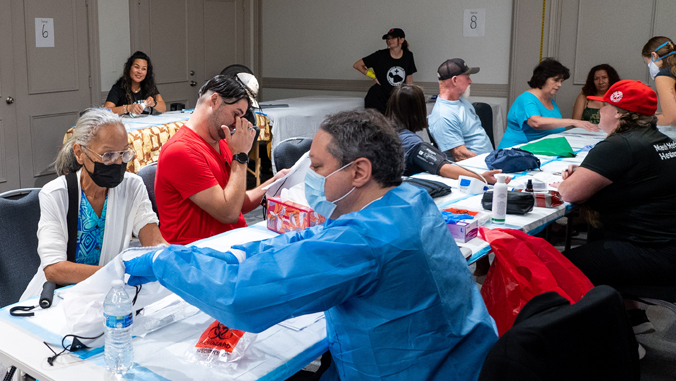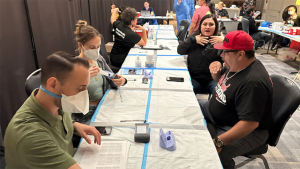
Ahead of the one-year anniversary of the devastating Maui wildfires, the most comprehensive study focused on understanding and mitigating the health and social impacts of the fires, has received a $1.4 million grant from the National Institutes of Health (NIH) to continue its groundbreaking work.
The Maui Wildfire Exposure Study (MauiWES), led by University of Hawaiʻi at Mānoa researchers, will follow study participants over at least the next five years to document their acute and chronic health impacts and social conditions. The $1.4 million NIH grant will help fund the longitudinal aspect of the study for up to 1,000 participants for two years, and researchers plan to renew the funding for an additional three years.

The project is led by Ruben Juarez, UH Economic Research Organization (UHERO)-HMSA Distinguished Professor of Health Economics in the UH Mānoa College of Social Sciences, and Alika Maunakea, professor in the Department of Anatomy, Biochemistry and Physiology at the UH Mānoa John A. Burns School of Medicine (JABSOM).
“Securing rapid funding for disaster research is a formidable challenge, yet it’s crucial for understanding and mitigating long-term impacts,” Juarez said. “With this funding, we have the opportunity to delve deeper into the chronic health effects of the Maui wildfires. We aim to not only document these impacts but also to drive positive societal change by informing future health policies and support systems for affected communities.”
MauiWES progress
The study launched in January 2024 and has recruited nearly 1,000 participants so far thanks to initial seed funding from the Hawaiʻi Community Foundation Maui Strong Fund and Kaiser Permanente. Juarez and Maunakea hope to recruit an additional 1,000 children and first responders with support from the State of Hawaiʻi in addition to building a registry of up to 10,000 individuals affected by the fires.
In May 2024, MauiWES released its first comprehensive report based on surveys and tests collected directly from participants. The results are based on samples collected from 679 participants, two-thirds of whom resided in Lahaina at the time of the fires. The other participants either worked in Lahaina, or resided or worked in fire-affected areas in Kula.
Among the findings, nearly half of the Maui residents affected by the fires experienced a decline in health compared to a year ago, and they continue to face difficulties accessing medical care and medications. See this UH News story for the entire report.
“Our findings underscore the critical need for ongoing support from stakeholders and funders, as well as the importance of leveraging community power to reach underserved populations,” Maunakea said. “While Maui’s ʻāina and its people continue to heal, addressing health concerns alongside other issues like housing remain a high priority; results from this study will offer insights into preventing widening disparities to ensure a more equitable recovery for all those affected by the wildfires.”
The research team has also launched the MauiWES interactive dashboard, which contains all available data for the community to be informed about the fires.
This public impact research project is the result of an ongoing partnership between UHERO and JABSOM.

